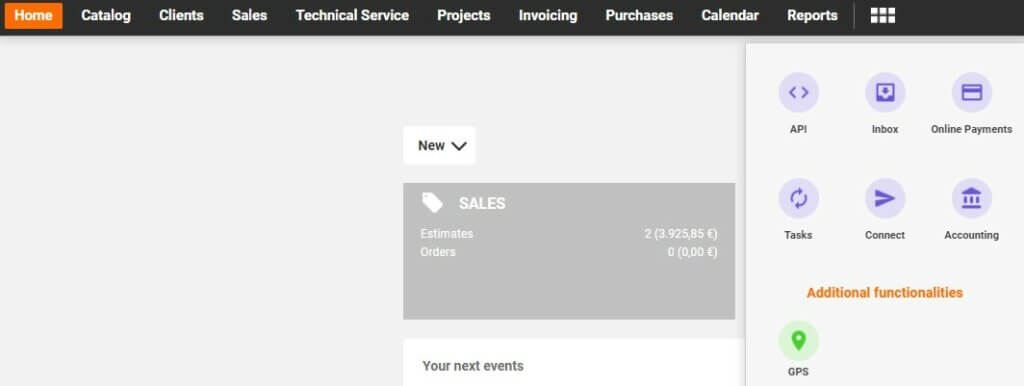This article will cover the definition of ERP, why it’s important for service businesses and the key points to consider when choosing one.
Table of Contents
What is an ERP?
ERP stands for “Enterprise Resource Planning“. ERP software is software or a platform that businesses use to manage and integrate the most important areas of their operations, such as expenses, sales, CRM or inventory.
ERP software usually offers integrated solutions that are separated by functions or areas that all the company to access all information from different business units from a single application or unified interface. For instance, some business functions that an ERP may include are shown below:
In the past, implementing an ERP software system required a large investment in time and money that only large companies could afford, though it typically improved productivity drastically.
Thanks to constantly evolving technology, cloud-based solutions have been developed that have lowered costs allowing any company to benefit from the efficiency gains from adopting an ERP software system.
Advantages of an ERP system
Some of the key benefits of an ERP system are:
- Centralized and traceable information: avoid data loss and easily identify the origin of key information.
- Ease of access: All memebers of an organization can use the same ERP.
- Automate repetitive tasks and processes.
All of this leads to time savings, decreased costs and increases in productivity.
In addition, this helps managers to make better decisions by creating a central repository for information that can produce informative reports using real-time data from any area of the company.
Disadvantages of ERP software
There are two major obstacles to most ERP systems: price and implementation costs.
Most ERPs on the market offer some level of customization, but this can still represent a significant increase in price when compared with off the shelf solutions. Fortunately, ERP software is increasingly designed, so any company can use it without missing out on any important functions. This means the percentage of companies that need a fully customized ERP solution is becoming a thing of the past.
The second major problem with many ERPs is a tendency to require complex, lengthy and often costly onboarding and implementation processes, depending on the type of business and the complexity of the system being implemented. Some factors that affect this process are the system previously in place, the volume of information needing to be transfered, and the standardization and format of that data.
Over the past 20 years, the price of ERP software has become affordable enough for most companies that the biggest issue is usually related to implementation, which can lead to information loss or disruptions to operations ultimately resulting in lost revenue. To offset this, software providers typically provide assistance during this process to reduce the cost, time and effort needed to implement their ERP software systems.
Types of companies that need an ERP
Regardless of the size of your business, a tool that can centralize information, standardize processes, facilitate access to data, and improve clarity and decision-making is key to sustained long-term growth. Whether you are a small residential contractor or an established business with many employees, the ability to leverage ERP tools that reduce repetitve tasks, ensure data reliability, and promote productivity across your operation is sure to pay dividends. Which means, if you’re reading this, an ERP system is likely to boost your productivity and improve your bottom line.
Start your 15-day free trial of STEL Order, our cloud-based end-to-end ERP software, here:
[button background-color=#fd6c00 color=white type=”big” class=”get-started botonCrear”]FREE Trial[/button]

